University Healthcare Report: Consequences of Fatness on Social Media
VerifiedAdded on 2022/10/01
|6
|1411
|476
Report
AI Summary
This report delves into the social and personal consequences of how fatness is represented on social media, focusing on the impact of stigmatizing attitudes, negative portrayals, and fat-shaming. It examines research findings on the effects of these representations on individuals' mental and physical health, academic performance, and personal relationships. The report discusses how social media platforms contribute to the discourse surrounding obesity, including the role of humor, emotional responses, and the promotion of external attributions. It also analyzes studies on the effectiveness of programs like 'The Biggest Loser' and the influence of social media on body image, self-efficacy, and health behaviors. Ultimately, the report concludes that while social media can encourage obesity management, disparaging comments and remarks about obese and fat people have negative consequences on their health and wellbeing.
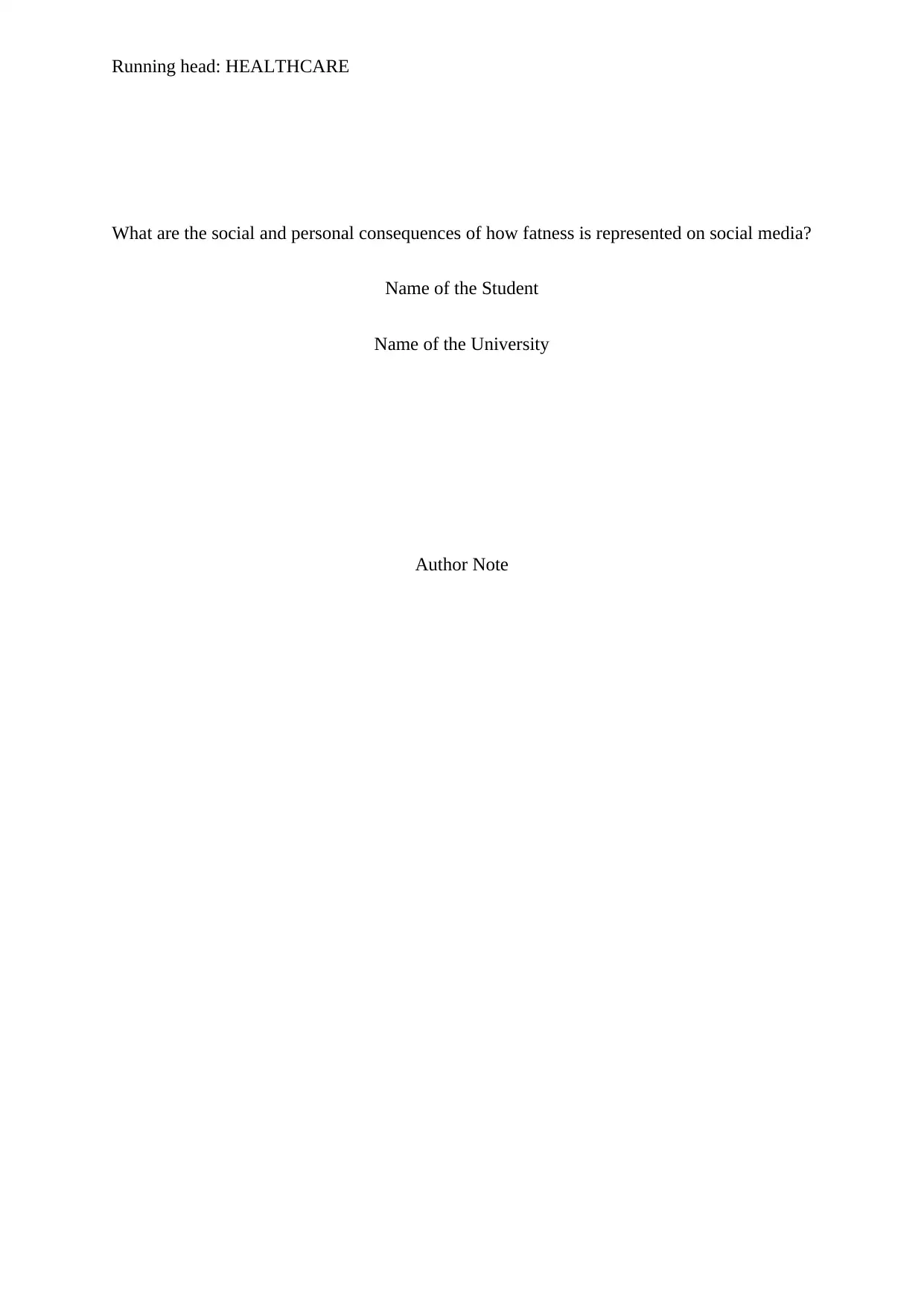
Running head: HEALTHCARE
What are the social and personal consequences of how fatness is represented on social media?
Name of the Student
Name of the University
Author Note
What are the social and personal consequences of how fatness is represented on social media?
Name of the Student
Name of the University
Author Note
Paraphrase This Document
Need a fresh take? Get an instant paraphrase of this document with our AI Paraphraser
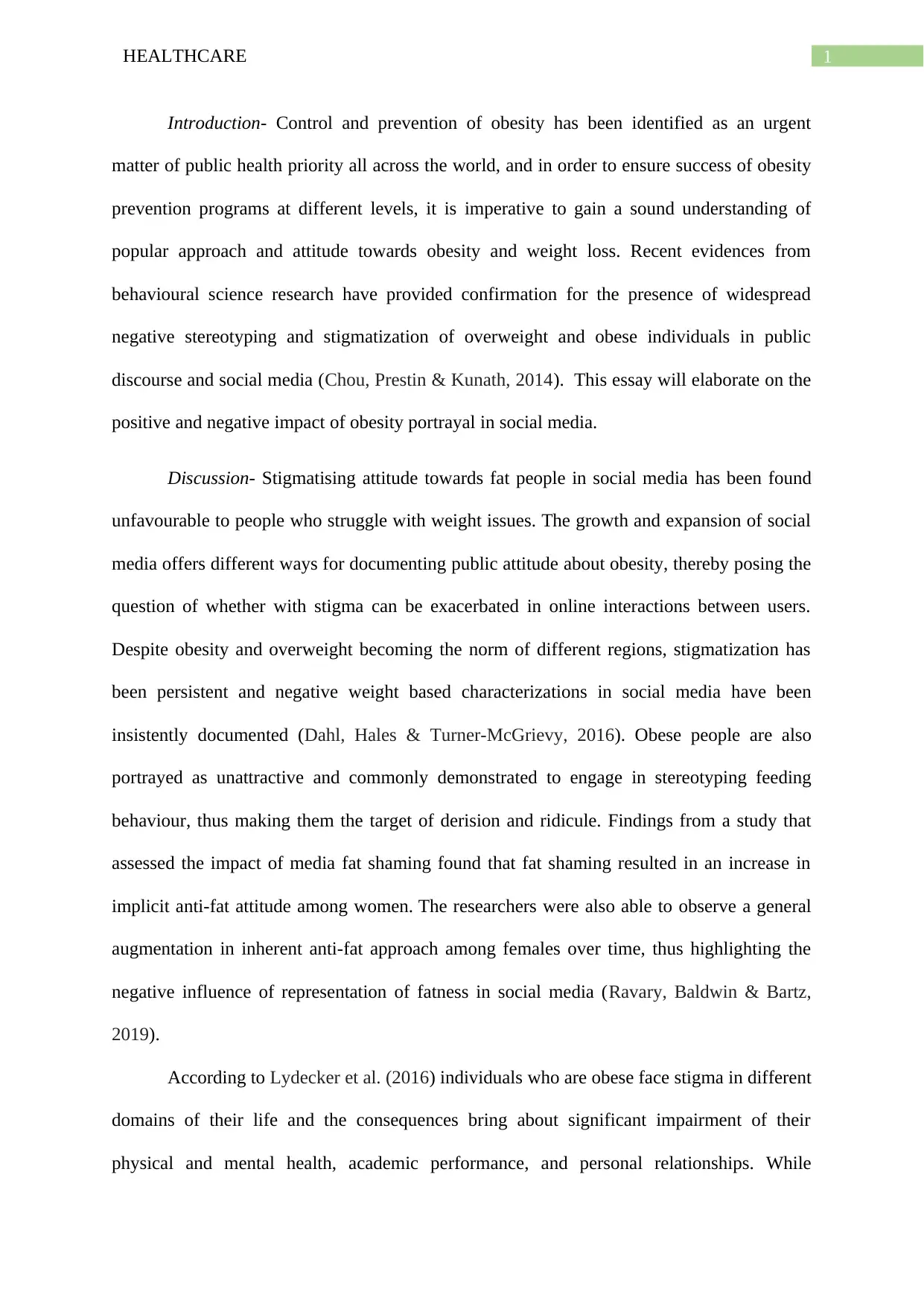
1HEALTHCARE
Introduction- Control and prevention of obesity has been identified as an urgent
matter of public health priority all across the world, and in order to ensure success of obesity
prevention programs at different levels, it is imperative to gain a sound understanding of
popular approach and attitude towards obesity and weight loss. Recent evidences from
behavioural science research have provided confirmation for the presence of widespread
negative stereotyping and stigmatization of overweight and obese individuals in public
discourse and social media (Chou, Prestin & Kunath, 2014). This essay will elaborate on the
positive and negative impact of obesity portrayal in social media.
Discussion- Stigmatising attitude towards fat people in social media has been found
unfavourable to people who struggle with weight issues. The growth and expansion of social
media offers different ways for documenting public attitude about obesity, thereby posing the
question of whether with stigma can be exacerbated in online interactions between users.
Despite obesity and overweight becoming the norm of different regions, stigmatization has
been persistent and negative weight based characterizations in social media have been
insistently documented (Dahl, Hales & Turner-McGrievy, 2016). Obese people are also
portrayed as unattractive and commonly demonstrated to engage in stereotyping feeding
behaviour, thus making them the target of derision and ridicule. Findings from a study that
assessed the impact of media fat shaming found that fat shaming resulted in an increase in
implicit anti-fat attitude among women. The researchers were also able to observe a general
augmentation in inherent anti-fat approach among females over time, thus highlighting the
negative influence of representation of fatness in social media (Ravary, Baldwin & Bartz,
2019).
According to Lydecker et al. (2016) individuals who are obese face stigma in different
domains of their life and the consequences bring about significant impairment of their
physical and mental health, academic performance, and personal relationships. While
Introduction- Control and prevention of obesity has been identified as an urgent
matter of public health priority all across the world, and in order to ensure success of obesity
prevention programs at different levels, it is imperative to gain a sound understanding of
popular approach and attitude towards obesity and weight loss. Recent evidences from
behavioural science research have provided confirmation for the presence of widespread
negative stereotyping and stigmatization of overweight and obese individuals in public
discourse and social media (Chou, Prestin & Kunath, 2014). This essay will elaborate on the
positive and negative impact of obesity portrayal in social media.
Discussion- Stigmatising attitude towards fat people in social media has been found
unfavourable to people who struggle with weight issues. The growth and expansion of social
media offers different ways for documenting public attitude about obesity, thereby posing the
question of whether with stigma can be exacerbated in online interactions between users.
Despite obesity and overweight becoming the norm of different regions, stigmatization has
been persistent and negative weight based characterizations in social media have been
insistently documented (Dahl, Hales & Turner-McGrievy, 2016). Obese people are also
portrayed as unattractive and commonly demonstrated to engage in stereotyping feeding
behaviour, thus making them the target of derision and ridicule. Findings from a study that
assessed the impact of media fat shaming found that fat shaming resulted in an increase in
implicit anti-fat attitude among women. The researchers were also able to observe a general
augmentation in inherent anti-fat approach among females over time, thus highlighting the
negative influence of representation of fatness in social media (Ravary, Baldwin & Bartz,
2019).
According to Lydecker et al. (2016) individuals who are obese face stigma in different
domains of their life and the consequences bring about significant impairment of their
physical and mental health, academic performance, and personal relationships. While
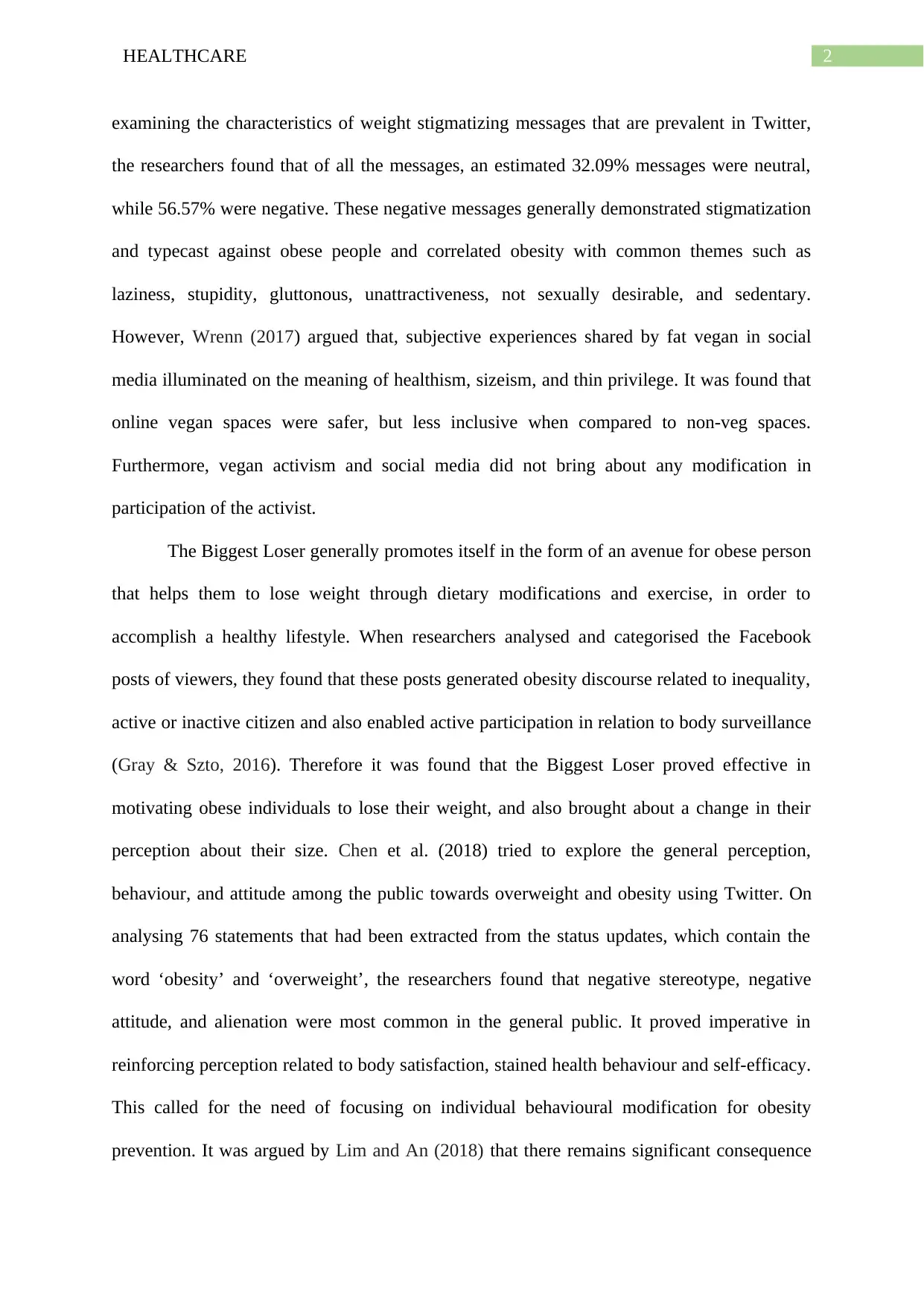
2HEALTHCARE
examining the characteristics of weight stigmatizing messages that are prevalent in Twitter,
the researchers found that of all the messages, an estimated 32.09% messages were neutral,
while 56.57% were negative. These negative messages generally demonstrated stigmatization
and typecast against obese people and correlated obesity with common themes such as
laziness, stupidity, gluttonous, unattractiveness, not sexually desirable, and sedentary.
However, Wrenn (2017) argued that, subjective experiences shared by fat vegan in social
media illuminated on the meaning of healthism, sizeism, and thin privilege. It was found that
online vegan spaces were safer, but less inclusive when compared to non-veg spaces.
Furthermore, vegan activism and social media did not bring about any modification in
participation of the activist.
The Biggest Loser generally promotes itself in the form of an avenue for obese person
that helps them to lose weight through dietary modifications and exercise, in order to
accomplish a healthy lifestyle. When researchers analysed and categorised the Facebook
posts of viewers, they found that these posts generated obesity discourse related to inequality,
active or inactive citizen and also enabled active participation in relation to body surveillance
(Gray & Szto, 2016). Therefore it was found that the Biggest Loser proved effective in
motivating obese individuals to lose their weight, and also brought about a change in their
perception about their size. Chen et al. (2018) tried to explore the general perception,
behaviour, and attitude among the public towards overweight and obesity using Twitter. On
analysing 76 statements that had been extracted from the status updates, which contain the
word ‘obesity’ and ‘overweight’, the researchers found that negative stereotype, negative
attitude, and alienation were most common in the general public. It proved imperative in
reinforcing perception related to body satisfaction, stained health behaviour and self-efficacy.
This called for the need of focusing on individual behavioural modification for obesity
prevention. It was argued by Lim and An (2018) that there remains significant consequence
examining the characteristics of weight stigmatizing messages that are prevalent in Twitter,
the researchers found that of all the messages, an estimated 32.09% messages were neutral,
while 56.57% were negative. These negative messages generally demonstrated stigmatization
and typecast against obese people and correlated obesity with common themes such as
laziness, stupidity, gluttonous, unattractiveness, not sexually desirable, and sedentary.
However, Wrenn (2017) argued that, subjective experiences shared by fat vegan in social
media illuminated on the meaning of healthism, sizeism, and thin privilege. It was found that
online vegan spaces were safer, but less inclusive when compared to non-veg spaces.
Furthermore, vegan activism and social media did not bring about any modification in
participation of the activist.
The Biggest Loser generally promotes itself in the form of an avenue for obese person
that helps them to lose weight through dietary modifications and exercise, in order to
accomplish a healthy lifestyle. When researchers analysed and categorised the Facebook
posts of viewers, they found that these posts generated obesity discourse related to inequality,
active or inactive citizen and also enabled active participation in relation to body surveillance
(Gray & Szto, 2016). Therefore it was found that the Biggest Loser proved effective in
motivating obese individuals to lose their weight, and also brought about a change in their
perception about their size. Chen et al. (2018) tried to explore the general perception,
behaviour, and attitude among the public towards overweight and obesity using Twitter. On
analysing 76 statements that had been extracted from the status updates, which contain the
word ‘obesity’ and ‘overweight’, the researchers found that negative stereotype, negative
attitude, and alienation were most common in the general public. It proved imperative in
reinforcing perception related to body satisfaction, stained health behaviour and self-efficacy.
This called for the need of focusing on individual behavioural modification for obesity
prevention. It was argued by Lim and An (2018) that there remains significant consequence
⊘ This is a preview!⊘
Do you want full access?
Subscribe today to unlock all pages.

Trusted by 1+ million students worldwide
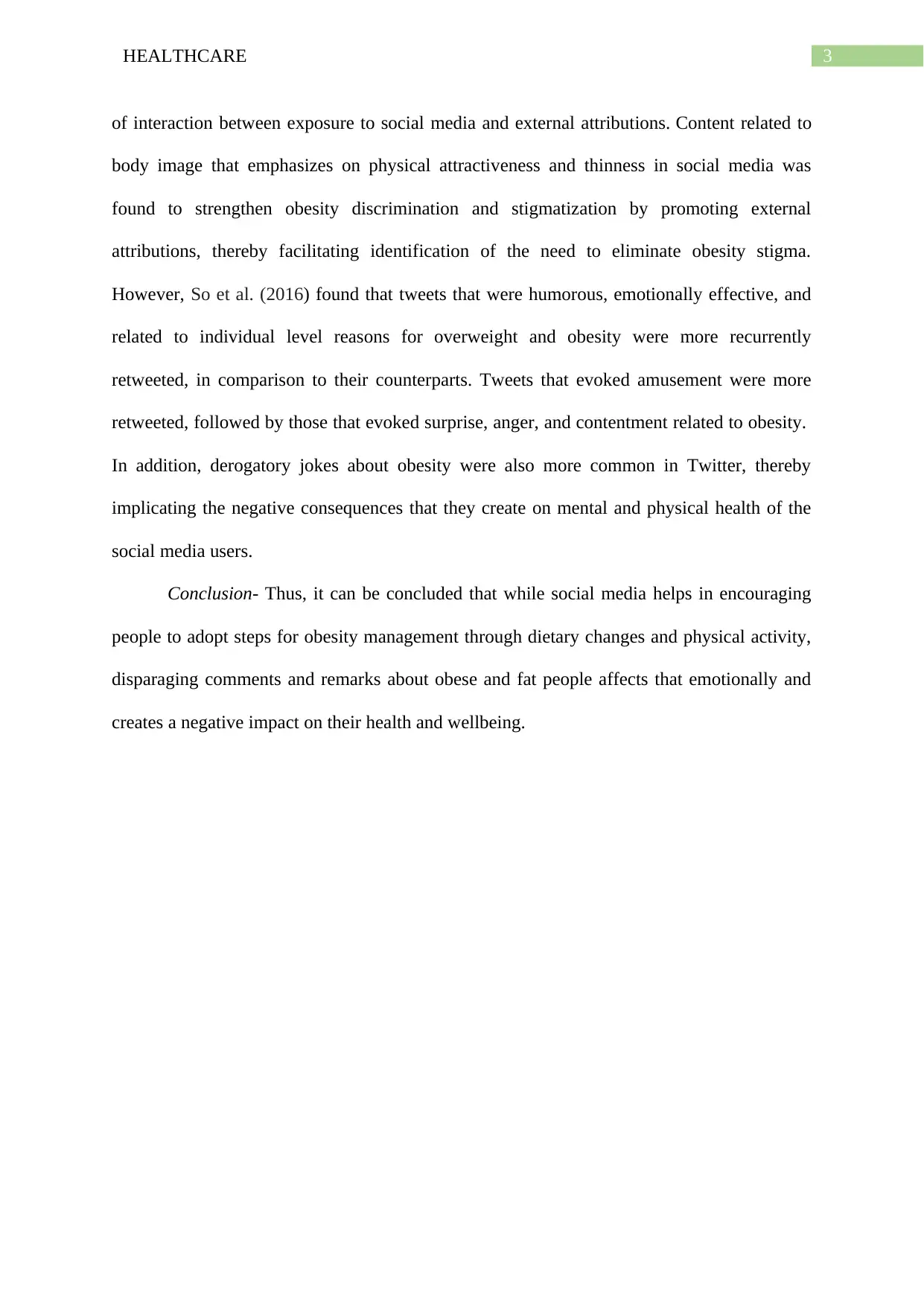
3HEALTHCARE
of interaction between exposure to social media and external attributions. Content related to
body image that emphasizes on physical attractiveness and thinness in social media was
found to strengthen obesity discrimination and stigmatization by promoting external
attributions, thereby facilitating identification of the need to eliminate obesity stigma.
However, So et al. (2016) found that tweets that were humorous, emotionally effective, and
related to individual level reasons for overweight and obesity were more recurrently
retweeted, in comparison to their counterparts. Tweets that evoked amusement were more
retweeted, followed by those that evoked surprise, anger, and contentment related to obesity.
In addition, derogatory jokes about obesity were also more common in Twitter, thereby
implicating the negative consequences that they create on mental and physical health of the
social media users.
Conclusion- Thus, it can be concluded that while social media helps in encouraging
people to adopt steps for obesity management through dietary changes and physical activity,
disparaging comments and remarks about obese and fat people affects that emotionally and
creates a negative impact on their health and wellbeing.
of interaction between exposure to social media and external attributions. Content related to
body image that emphasizes on physical attractiveness and thinness in social media was
found to strengthen obesity discrimination and stigmatization by promoting external
attributions, thereby facilitating identification of the need to eliminate obesity stigma.
However, So et al. (2016) found that tweets that were humorous, emotionally effective, and
related to individual level reasons for overweight and obesity were more recurrently
retweeted, in comparison to their counterparts. Tweets that evoked amusement were more
retweeted, followed by those that evoked surprise, anger, and contentment related to obesity.
In addition, derogatory jokes about obesity were also more common in Twitter, thereby
implicating the negative consequences that they create on mental and physical health of the
social media users.
Conclusion- Thus, it can be concluded that while social media helps in encouraging
people to adopt steps for obesity management through dietary changes and physical activity,
disparaging comments and remarks about obese and fat people affects that emotionally and
creates a negative impact on their health and wellbeing.
Paraphrase This Document
Need a fresh take? Get an instant paraphrase of this document with our AI Paraphraser
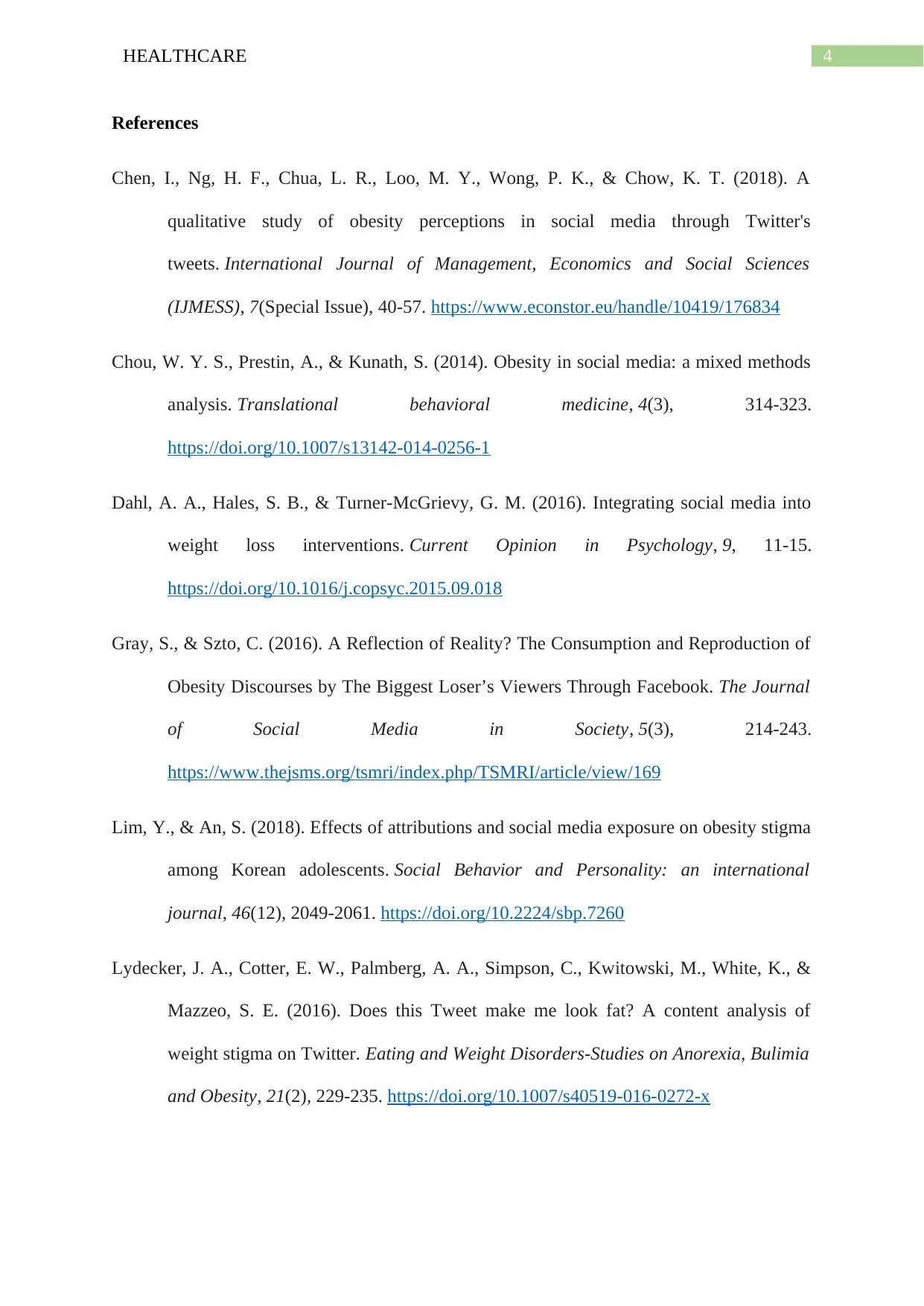
4HEALTHCARE
References
Chen, I., Ng, H. F., Chua, L. R., Loo, M. Y., Wong, P. K., & Chow, K. T. (2018). A
qualitative study of obesity perceptions in social media through Twitter's
tweets. International Journal of Management, Economics and Social Sciences
(IJMESS), 7(Special Issue), 40-57. https://www.econstor.eu/handle/10419/176834
Chou, W. Y. S., Prestin, A., & Kunath, S. (2014). Obesity in social media: a mixed methods
analysis. Translational behavioral medicine, 4(3), 314-323.
https://doi.org/10.1007/s13142-014-0256-1
Dahl, A. A., Hales, S. B., & Turner-McGrievy, G. M. (2016). Integrating social media into
weight loss interventions. Current Opinion in Psychology, 9, 11-15.
https://doi.org/10.1016/j.copsyc.2015.09.018
Gray, S., & Szto, C. (2016). A Reflection of Reality? The Consumption and Reproduction of
Obesity Discourses by The Biggest Loser’s Viewers Through Facebook. The Journal
of Social Media in Society, 5(3), 214-243.
https://www.thejsms.org/tsmri/index.php/TSMRI/article/view/169
Lim, Y., & An, S. (2018). Effects of attributions and social media exposure on obesity stigma
among Korean adolescents. Social Behavior and Personality: an international
journal, 46(12), 2049-2061. https://doi.org/10.2224/sbp.7260
Lydecker, J. A., Cotter, E. W., Palmberg, A. A., Simpson, C., Kwitowski, M., White, K., &
Mazzeo, S. E. (2016). Does this Tweet make me look fat? A content analysis of
weight stigma on Twitter. Eating and Weight Disorders-Studies on Anorexia, Bulimia
and Obesity, 21(2), 229-235. https://doi.org/10.1007/s40519-016-0272-x
References
Chen, I., Ng, H. F., Chua, L. R., Loo, M. Y., Wong, P. K., & Chow, K. T. (2018). A
qualitative study of obesity perceptions in social media through Twitter's
tweets. International Journal of Management, Economics and Social Sciences
(IJMESS), 7(Special Issue), 40-57. https://www.econstor.eu/handle/10419/176834
Chou, W. Y. S., Prestin, A., & Kunath, S. (2014). Obesity in social media: a mixed methods
analysis. Translational behavioral medicine, 4(3), 314-323.
https://doi.org/10.1007/s13142-014-0256-1
Dahl, A. A., Hales, S. B., & Turner-McGrievy, G. M. (2016). Integrating social media into
weight loss interventions. Current Opinion in Psychology, 9, 11-15.
https://doi.org/10.1016/j.copsyc.2015.09.018
Gray, S., & Szto, C. (2016). A Reflection of Reality? The Consumption and Reproduction of
Obesity Discourses by The Biggest Loser’s Viewers Through Facebook. The Journal
of Social Media in Society, 5(3), 214-243.
https://www.thejsms.org/tsmri/index.php/TSMRI/article/view/169
Lim, Y., & An, S. (2018). Effects of attributions and social media exposure on obesity stigma
among Korean adolescents. Social Behavior and Personality: an international
journal, 46(12), 2049-2061. https://doi.org/10.2224/sbp.7260
Lydecker, J. A., Cotter, E. W., Palmberg, A. A., Simpson, C., Kwitowski, M., White, K., &
Mazzeo, S. E. (2016). Does this Tweet make me look fat? A content analysis of
weight stigma on Twitter. Eating and Weight Disorders-Studies on Anorexia, Bulimia
and Obesity, 21(2), 229-235. https://doi.org/10.1007/s40519-016-0272-x
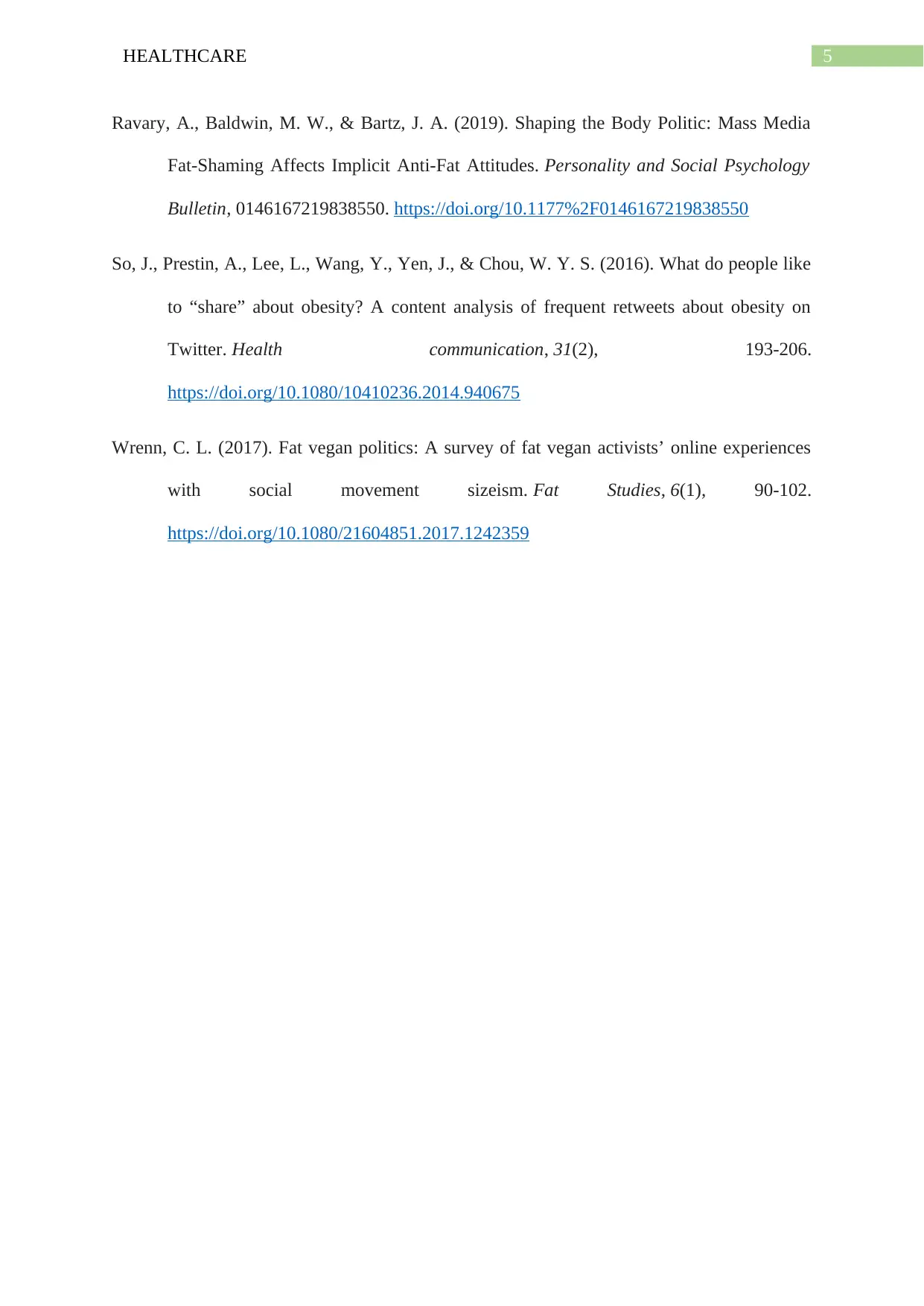
5HEALTHCARE
Ravary, A., Baldwin, M. W., & Bartz, J. A. (2019). Shaping the Body Politic: Mass Media
Fat-Shaming Affects Implicit Anti-Fat Attitudes. Personality and Social Psychology
Bulletin, 0146167219838550. https://doi.org/10.1177%2F0146167219838550
So, J., Prestin, A., Lee, L., Wang, Y., Yen, J., & Chou, W. Y. S. (2016). What do people like
to “share” about obesity? A content analysis of frequent retweets about obesity on
Twitter. Health communication, 31(2), 193-206.
https://doi.org/10.1080/10410236.2014.940675
Wrenn, C. L. (2017). Fat vegan politics: A survey of fat vegan activists’ online experiences
with social movement sizeism. Fat Studies, 6(1), 90-102.
https://doi.org/10.1080/21604851.2017.1242359
Ravary, A., Baldwin, M. W., & Bartz, J. A. (2019). Shaping the Body Politic: Mass Media
Fat-Shaming Affects Implicit Anti-Fat Attitudes. Personality and Social Psychology
Bulletin, 0146167219838550. https://doi.org/10.1177%2F0146167219838550
So, J., Prestin, A., Lee, L., Wang, Y., Yen, J., & Chou, W. Y. S. (2016). What do people like
to “share” about obesity? A content analysis of frequent retweets about obesity on
Twitter. Health communication, 31(2), 193-206.
https://doi.org/10.1080/10410236.2014.940675
Wrenn, C. L. (2017). Fat vegan politics: A survey of fat vegan activists’ online experiences
with social movement sizeism. Fat Studies, 6(1), 90-102.
https://doi.org/10.1080/21604851.2017.1242359
⊘ This is a preview!⊘
Do you want full access?
Subscribe today to unlock all pages.

Trusted by 1+ million students worldwide
1 out of 6
Related Documents
Your All-in-One AI-Powered Toolkit for Academic Success.
+13062052269
info@desklib.com
Available 24*7 on WhatsApp / Email
![[object Object]](/_next/static/media/star-bottom.7253800d.svg)
Unlock your academic potential
Copyright © 2020–2025 A2Z Services. All Rights Reserved. Developed and managed by ZUCOL.





